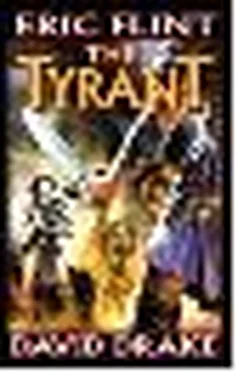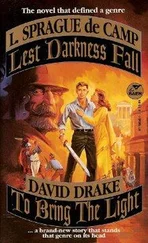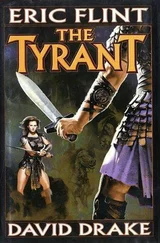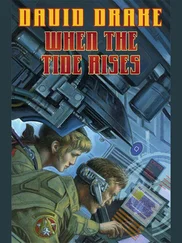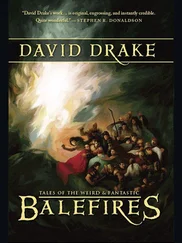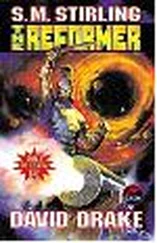David Drake - Tyrant
Здесь есть возможность читать онлайн «David Drake - Tyrant» весь текст электронной книги совершенно бесплатно (целиком полную версию без сокращений). В некоторых случаях можно слушать аудио, скачать через торрент в формате fb2 и присутствует краткое содержание. Жанр: Боевая фантастика, на английском языке. Описание произведения, (предисловие) а так же отзывы посетителей доступны на портале библиотеки ЛибКат.
- Название:Tyrant
- Автор:
- Жанр:
- Год:неизвестен
- ISBN:нет данных
- Рейтинг книги:5 / 5. Голосов: 1
-
Избранное:Добавить в избранное
- Отзывы:
-
Ваша оценка:
- 100
- 1
- 2
- 3
- 4
- 5
Tyrant: краткое содержание, описание и аннотация
Предлагаем к чтению аннотацию, описание, краткое содержание или предисловие (зависит от того, что написал сам автор книги «Tyrant»). Если вы не нашли необходимую информацию о книге — напишите в комментариях, мы постараемся отыскать её.
Tyrant — читать онлайн бесплатно полную книгу (весь текст) целиком
Ниже представлен текст книги, разбитый по страницам. Система сохранения места последней прочитанной страницы, позволяет с удобством читать онлайн бесплатно книгу «Tyrant», без необходимости каждый раз заново искать на чём Вы остановились. Поставьте закладку, и сможете в любой момент перейти на страницу, на которой закончили чтение.
Интервал:
Закладка:
All Adrian could do was stare at the walls of his tent. Until finally, hours later, he gave out the cry which had been building since the first moment Raj and Center entered his mind:
Is everything just a maneuver?
* * *
He would spend the rest of his life pondering a ghost's answer. Never really knowing if he agreed or not.
Yes, everything is a maneuver. No, it's not just a maneuver.
Chapter 9
Over the centuries, as the twelve villages which formed the original core of Vanbert had expanded to conquer half the world, the edifices of the Confederacy's government had undergone their own massive expansion. Whether torn down and rebuilt, or swollen by modification and accretion, the complex of buildings and plazas had become something of a monstrosity itself.
So, at least, thought Demansk, as he worked his way across the Forum of the Virtuous Matrons toward the still-distant but imposing Council Hall. "Threaded his way" was perhaps a better description. The Forum was filled with a huge crowd, as always after rumors spread of a major oncoming shift in political power in the Council. Most of the mob were simply curious. A large number were street vendors. Still others were taking advantage of the traditional custom of allowing unlimited speech in the Forum to harangue the crowd from jury-rigged speakers' pedestals. Others—
His sons were walking just behind him. He heard Olver whisper to the others: "Careful now; keep an eye out. Some of these fellows are not loitering."
Demansk, as befitted his aloof dignity as a Justiciar, ignored the whisper. He ignored as well the temptation to place his hand on the battle-ax hanging from his waist. At the moment, the temptation was hard to resist. There were a lot of suspicious-looking men here and there in the crowd, under whose robes might be concealed any number of weapons.
The ax was a ceremonial weapon; sized more like a hatchet than an ax. Because of his status as a Justiciar, Demansk was allowed an ax rather than the long knife permitted to simple Councillors. But where most members of the Council carried elaborately carved and inlaid "weapons" — some of them even with silver blades — Demansk's ax of office was perfectly functional. The blade was good steel, and sharpened to a working edge.
Still, he resisted the impulse. Dignity, manifesting itself among other ways in an apparent indifference to danger, was an essential ingredient for the "public aura" of a central Vanbert official. It was for that same reason that Demansk was unaccompanied by any bodyguards. His sons would have to do for that.
Which, when all was said and done, made the task of any would-be assassins quite difficult. All three of Demansk's sons were strong and healthy men. His two oldest, Barrett and Olver, were also experienced soldiers. The youngest, Trae, had only limited experience in battle — a single skirmish against the pirate raid which had resulted in his sister's abduction. But, perhaps oddly given his fascination with gadgetry and natural philosophy, Trae was actually the most athletic of the three. And if his combat experience was slight, the young man had never stinted on his training.
So Demansk was not surprised to see the subtle but careful way in which his sons shielded him as he made his way through the crowd. Nor was he surprised at the manner in which each of the three handled the task of moving people aside. Barrett, brusquely and rudely — he'd knocked down an old woman some fifty paces back; Olver, with his usual stolid firmness; Trae, as often as not, with a smile and a jest.
Another jest now, as he lifted (quite easily) a rather portly matron by the armpits and set her to one side. "Madame, you tempt me too much in my progress! For shame — here in the Forum!"
The matron's squawk of protest choked off into a giggle. She waved the fan vigorously in front of her face, and returned Trae's humor with gleaming eyes which were quite inappropriate for her respectable status. Despite himself, Demansk couldn't entirely force down a smile.
The Forum of the Virtuous Matrons was named after one of the many episodes in Vanbert's early history. The matrons of a small Vanbert village had committed suicide rather than be ravished by a band of raiders from a nearby tribe who had overcome their husbands on the field of battle.
So, at least, according to legend. Demansk had his doubts. The "field of battle" would have been a small meadow, filled for a time by sweaty, shouting pig farmers struggling with sweaty and shouting shepherds. As for the rest, who was to say?
It hardly mattered. Truth or legend, this much was certain: that small tribe of shepherds had been annihilated shortly thereafter. Even in the semi-mythical ancient days, the folk who would become Vanbert had been ruthless with their enemies. Ruthless, yet, in an odd sort of way, not given to holding grudges once their purpose was accomplished. The male shepherds would have been massacred, the women turned into concubines. But the offspring born of those women thereafter would have been, within not more than two generations, accepted without thought as part of the growing Confederacy. Just as would any bastards born of ravished Vanbert women less "virtuous" than the matrons of myth.
Demansk chewed on that thought as he threaded his way toward the Council Hall. Even as he destroyed the Vanbert that was, he realized, he would be bringing back to life some of its ancient ways. Become an empire, Vanbert had begun to hold grudges. Say better, had justified greed with the name of "grudge." Conquered folk now were enslaved, and remained in slavery — generation succeeding generation. A nation born of pig farmers copulating in huts, with little care for the origins of their offspring, had become an empire whose aristocracy was obsessed with "good blood."
His grandfather, he remembered, had not been much impressed with the newer strains of purebred pigs. Dogs, either. "Mongrels are always best," he could remember the old man telling him. "They may not be as fat or as pretty, but they'll last. And there's nothing wrong with chewing tough meat, anyway. Good for your jaws."
* * *
A whisper from Barrett broke his train of thought. "Won't be any trouble today, I don't think. Everybody's still wondering which way things will shake down."
There was an edge of excessive eagerness in his voice that irritated Demansk. But he let no sign of it show on his face.
Barrett was too ambitious. He had been so from at least the age of twelve. And it was an ambition unleavened by any kind of deeper thought. Where solemn Olver had carefully studied the writings of Jasprem and the speeches of Acclide and Lurth — if not the Emerald philosophers whom young Trae cherished — Barrett had never seen any need to add wisdom to intelligence.
Just as Helga had predicted, Barrett had already sent away his wife and prepared divorce proceedings. He was, as the Emerald sage Howark would have put it, entirely a "man of the senses."
So be it. That, too, Demansk would use ruthlessly.
They'd finally reached the short flight of wide marble stairs that led up to the Council Hall. A squad of soldiers kept the people thronging in the Forum from spilling onto the stairs. The stair and the hall itself were reserved for Councillors and their invited guests. The squad leader recognized Demansk at a glance and gave him a tiny nod.
Now that he was through the mob, Demansk felt he could let the pose of august dignity slip a bit. So he took the stairs in his accustomed vigorous stride instead of the leisurely amble which he'd been restricting himself to.
A moment later, he and his sons had passed under the great pillared archway leading into the antechamber of the hall. It was cooler inside, if a bit stuffy. The antechamber, lacking any of the large windows which allowed light into the great central room where the Council met for its deliberations, was rather dark. The faces of the ponderous statues of mythic heroes from Vanbert's past which lined the walls of the antechamber seemed even gloomier than usual.
Читать дальшеИнтервал:
Закладка:
Похожие книги на «Tyrant»
Представляем Вашему вниманию похожие книги на «Tyrant» списком для выбора. Мы отобрали схожую по названию и смыслу литературу в надежде предоставить читателям больше вариантов отыскать новые, интересные, ещё непрочитанные произведения.
Обсуждение, отзывы о книге «Tyrant» и просто собственные мнения читателей. Оставьте ваши комментарии, напишите, что Вы думаете о произведении, его смысле или главных героях. Укажите что конкретно понравилось, а что нет, и почему Вы так считаете.
